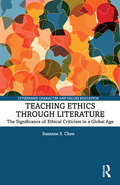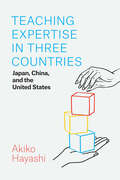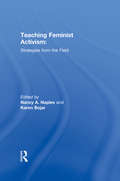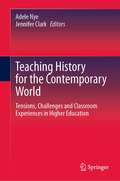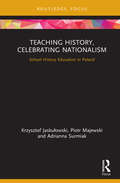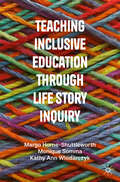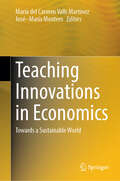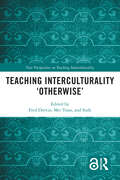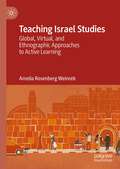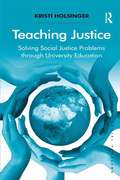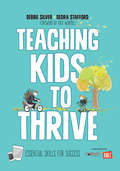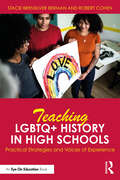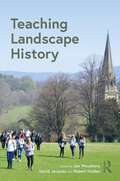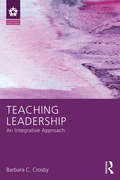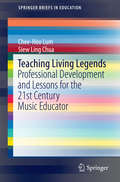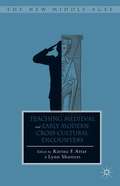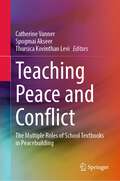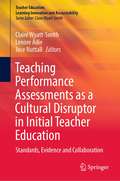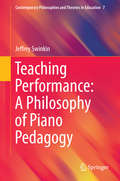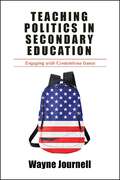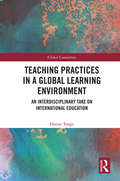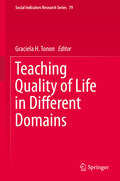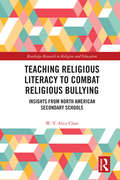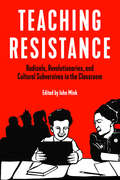- Table View
- List View
Teaching Ethics through Literature: Igniting the Global Imagination (Citizenship, Character and Values Education)
by Suzanne S. ChooTeaching Ethics through Literature provides in-depth understanding of a new and exciting shift in the fields of English education, Literature, Language Arts, and Literacy through exploring their connections with ethics. The book pioneers an approach to integrating ethics in the teaching of literature. This has become increasingly relevant and necessary in our globally connected age. A key feature of the book is its integration of theory and practice. It begins with a historical survey of the emergence of the ethical turn in Literature education and grounds this on the ideas of influential Ethical Philosophers and Literature scholars. Most importantly, it provides insights into how teachers can engage students in ethical concerns and apply practices of Ethical Criticism using rich on-the-ground case studies of high school Literature teachers in Australia, Singapore and the United States.
Teaching Expertise in Three Countries: Japan, China, and the United States
by Akiko HayashiA comparison of the development of expertise in preschool teaching in China, Japan, and the United States. In Teaching Expertise in Three Countries, Akiko Hayashi shows how teachers from Japan, China, and the United States think about what it means to be an expert teacher. Based on interviews with teachers conducted over the span of fifteen years and videos taken in their classrooms, Hayashi gives us a valuable portrait of expert teachers in the making. While Hayashi’s research uncovered cultural variations in the different national contexts, her analysis of how teachers adapted their pedagogy throughout their careers also revealed many cross-national similarities. Younger teachers often describe themselves as being in a rush, following scripts, and “talking too much,” while experienced teachers describe themselves as being quieter, knowing children better, and being more present. Including a foreword by scholar of early childhood education Joseph Tobin, Teaching Expertise in Three Countries provides a foundation for understanding the sequence and pathways of development over the first decade of teaching in three national contexts, demonstrating the value of the field of comparative education in the process.
Teaching Feminist Activism: Strategies from the Field
by Nancy A. Naples Karen BojarFrom theoretical analysis to practical teaching tools, an indispensable guide for educators seeking to link feminist theory and activism to their teaching. Included are web sites, videos, recommended texts, and additional course outlines.
Teaching History for the Contemporary World: Tensions, Challenges and Classroom Experiences in Higher Education
by Jennifer Clark Adele NyeThis book brings together history educators from Australia and around the world to tell their own personal stories and how they approach teaching history in the context of contemporary tensions in the classroom. It encourages historians to think actively about how history in the classroom can play a role in helping students to make sense of their world and to act honourably within it.The contributors come from diverse backgrounds and include experienced history educators and early career academics. They showcase both a mix of approaches and democratize and decolonize the academy. The book blends theory and practice. It reflects on what is happening in the classroom and supports the discipline to understanding itself better, to improve upon its practices and to engage in academic discussion about the responsibility of teaching in the contemporary world.
Teaching History, Celebrating Nationalism: School History Education in Poland
by Krzysztof Jaskułowski Piotr Majewski Adrianna SurmiakThis book analyses the relationship between history education and nationalism in the context of the dominant structures of collective memory in Poland. Drawing on original qualitative research with history teachers, it explores the ways in which teachers understand the aims of history teaching and how they teach history, with some contesting or negotiating official and hegemonic nationalist memory projects, while others predominantly reproduce or radicalise them. A study of teachers’ tendencies to approach history through the prism of nationalism, this study reveals a view of history lessons as a means of instilling national identity in students, as the past is constructed in nationalist terms and no contradiction is identified in viewing history as both an objective science and a ‘nationalising’ tool. An examination of the means by which a dominant nationalist discourse is reinforced through historical education, Teaching History, Celebrating Nationalism will appeal to scholars of sociology and education with interests in nationalism and memory studies.
Teaching Inclusive Education through Life Story Inquiry
by Margo Horne-Shuttleworth Monique Somma Kathy Ann WlodarczykThis practical textbook is designed as core reading for pre-service and in-service teachers and mental health practitioners in upper level Education and Psychology programs. Key concepts addressed in this case study collection include Inclusive Education as an overarching framework through the lens of Critical Disability Studies, Intersectionality and Mental Health. It portrays the first-hand accounts and lived experiences of individuals with disabilities to further understand the impact students’ classroom experiences have beyond their early school years. These accounts along with commentaries from education and health professionals inform evidence-based recommendations for educators and practitioners on prevention and intervention practices for school age children with disabilities. Readers will be prompted to consider their experiences and perspectives through chapter specific discussion-based and reflective questions that are designed to incorporate key concepts addressed throughout the text.
Teaching Innovations in Economics: Towards a Sustainable World
by José–María Montero María del Carmen Valls MartínezThis book highlights the latest technological innovations in economics education. Economics, as a discipline, not only studies the relationship between ends and scarce means, which can be used alternatively, but also serves as a social science that uses historical data to predict future events—a task complicated by the influence of human behavior. In economics, a solid theoretical foundation alone is insufficient; practical application requires a deep understanding of statistics. With the vast amount of information available today, data processing is now performed using specialized software. Consequently, teaching economics demands a wide range of complex skills that have significantly evolved in recent years, driven by the growing interest in educational innovation among professors and scientists, further accelerated by advancements in new technologies. Moreover, economics education is increasingly aligned with the global concern for sustainability, as emphasized in the United Nations' Agenda 2030. Professors are now integrating sustainability into syllabi and teaching methodologies. This book covers key topics such as: Technological and innovative advancements in economics education. New teaching-learning theories and models in economics education. The impact of digital transformation on economics education. The role of artificial intelligence in economics education. Addressing special educational needs in economics education. Evaluation of the teaching-learning process in economics. Assessment of student learning in economics. Development of materials and tools for economics education. Final projects (Undergraduate and Master's) in economics. Authored by leading professors and researchers in the field, this book presents a collection of chapters that rigorously explore teaching innovations in economics.
Teaching Interculturality 'Otherwise' (New Perspectives on Teaching Interculturality)
by Fred Dervin, Mei Yuan, and SudeThis edited volume focuses on the thorny and somewhat controversial issue of teaching (and learning) interculturality in a way that considers the notion from critical and reflexive perspectives when introduced to students. Comprised of three parts, the book discusses the nuts and bolts of teaching interculturally, considers changes in the teaching of interculturality, and provides pedagogical insights into interculturalising the notion. It studies both teaching im-/explicitly about interculturality and how to incorporate interculturality into teaching practices or into an institution. By sharing varied cases and theoretical reflections on the topic, the editors and contributors from different parts of the world aim to stimulate more initiatives to enrich the field instead of delimiting it, especially in complement to and beyond the 'West' or 'Global North', and also to build up further reflexivity in the way readers engage with interculturality in education. This will be a must-read for teachers and researchers of intercultural communication education at different educational levels, as well as anyone interested in scholarship on education for interculturality.
Teaching Israel Studies: Global, Virtual, and Ethnographic Approaches to Active Learning
by Amelia Rosenberg WeinrebThis book presents pedagogical strategies for today’s diverse Israel Studies classrooms. It offers Israel-specific innovations for online teaching, tested methods for organizing global virtual exchanges that uplift marginalized voices in Israel, including Palestinian voices, and an intellectual and political overview of the field. Informed by the author’s experiences in the classroom and principles shared with her by fellow instructors, the book provides a guide to developing an Israel Studies syllabus or integrating Israel Studies units into an existing curriculum
Teaching Justice: Solving Social Justice Problems through University Education (Solving Social Problems)
by Kristi HolsingerTeaching Justice explores the role that teaching and learning in higher education can play in solving problems of social injustice. Examining a range of approaches to education, it considers the challenges that exist in teaching about justice, drawing on extensive empirical data gathered amongst college lecturers and professors, as well as the author's own experience. With an analysis of the strategies commonly used this book will shed light on the manner in which students can be engaged in activism and concerned with issues of social injustice. By overcoming apathy and engaging students with social problems, education can thus address matters of injustice and begin to effect change. Presenting extensive international research and insightful analyses, Teaching Justice reveals the classroom and the lecture theatre to be important sites in the pursuit of social justice and will appeal to teachers and researchers with interests in social problems, education and educational methods, and criminal justice, as well as community engagement and service learning outside the classroom.
Teaching Kids to Thrive: Essential Skills for Success
by Debbie Thompson Silver Ms Dedra A. StaffordThere’s more to student success than standards and test scores… Integrating Social and Emotional Learning into a curriculum has been shown to increase personal and school-wide growth. With lifelong success the goal over simply meeting academic thresholds, Teaching Kids to Thrive presents strategies, activities, and stories in an approachable way to develop responsible, self-motivated learners. Uniting social, academic, and self-skills this instrumental resource offers benefits to students such as: Using mindfulness strategies to help students tap their inner strengths Learning to self-regulate and control other executive brain functions Developing growth mindsets along with perseverance and resilience Cultivating a sense of responsibility, honesty, and integrity Encouraging a capacity for empathy and gratitude
Teaching Kids to Thrive: Essential Skills for Success
by Debbie Thompson Silver Ms Dedra A. StaffordThere’s more to student success than standards and test scores… Integrating Social and Emotional Learning into a curriculum has been shown to increase personal and school-wide growth. With lifelong success the goal over simply meeting academic thresholds, Teaching Kids to Thrive presents strategies, activities, and stories in an approachable way to develop responsible, self-motivated learners. Uniting social, academic, and self-skills this instrumental resource offers benefits to students such as: Using mindfulness strategies to help students tap their inner strengths Learning to self-regulate and control other executive brain functions Developing growth mindsets along with perseverance and resilience Cultivating a sense of responsibility, honesty, and integrity Encouraging a capacity for empathy and gratitude
Teaching LGBTQ+ History in High Schools: Practical Strategies and Voices of Experience
by Robert Cohen Stacie Brensilver BermanTeaching LGBTQ+ History in High Schools: Practical Strategies and Voices of Experience offers insights, concrete strategies, and lesson plans for teaching LGBTQ+ history in high schools. With essays from educators, historians, and activists, it speaks to the power and significance of LGBTQ+-inclusive curriculum and its greater necessity at a time when the LGBTQ+ community is both more visible and increasingly targeted.Across the US, challenges exist that prevent teaching LGBTQ+ history, including curriculum censorship laws prohibiting discussion of the LGBTQ+ community in schools. However, there are also grassroots movements in the US that are generating quality LGBTQ+ history curriculum and implementing them in secondary schools. This book shows how integrating LGBTQ+ content offers myriad benefits for all students, including making history more relevant and representative, and reversing years of silence and erasure in the sources, topics, and narratives that students encounter throughout their education.Combining insights from changemakers with practical strategies and lesson plans for teaching LGBTQ+ history, this book will equip educators with the rationale and resources they need to effectively integrate this history into the curriculum. It will also be highly valuable for pre-service teachers, particularly within Social Studies Education and Social Justice Education.
Teaching Landscape History
by Jan Woudstra David JacquesLandscape history is changing in content and style to address the issues of today. Experienced teachers and authors on the history of gardens and landscapes come together in this new volume to share ideas on the future of teaching history in departments of landscape architecture, archaeology, geography and allied subjects. Design history remains important, but this volume brings to the fore the increasing importance of environmental history, economic history, landscape history, cultural landscapes, environmental justice and decolonisation, ideas of sustainability and climate change amelioration, which may all be useful in serving the needs of a widening range of students in an increasingly complex world. The main themes include: what history should we narrate in the education of landscape architects? how can we recognise counter-narratives and our own bias? how should we engage the students in the history of their chosen profession? how can designers and researchers be persuaded of the relevance of history teaching to theory and practice? and what resources do we need to develop teaching of landscape histories? This book will be of interest to anyone teaching courses on landscape architecture, urban design, horticulture, garden design, architectural history, cultural geography and more.
Teaching Leadership: An Integrative Approach (Leadership: Research and Practice)
by Barbara C. CrosbyTeaching Leadership provides guidance for leadership educators in a variety of organizational and community contexts and across academic disciplines. An experienced leadership educator, Crosby promotes an inclusive vision of leadership that recognizes the inherent leadership potential in everyone. Featuring interviews with 25 respected leadership educators, Teaching Leadership complicates and enriches the leader-follower dichotomy to advance a holistic and practice-oriented model of leadership education. Using the metaphor of ‘heart, head, and hands,’ Crosby shows how authentic leadership is an embodied practice based equally in emotional, intellectual, and experiential learning.
Teaching Living Legends
by Chee-Hoo Lum Siew Ling Ling ChuaThis book traces the research on the design, implementation and outcomes of a professional development program for in-service primary and secondary school teachers aimed at enhancing their understanding of living music traditions in Singapore and how these could be taught in the 21st century music classroom. It proposes a professional development framework comprising the areas of Pedagogy, Practice and Perspective to guide professional development design. The book also aims to promote further discussions on adult learning and teaching about teaching, especially with regard to developing self-efficacy to handle different music traditions in a 21st century, multi-ethnic society like Singapore.
Teaching Medieval And Early Modern Cross-cultural Encounters
by Karina F. Attar Lynn ShuttersDrawing from theatre, English studies, and art history, among others, these essays discuss the challenges and rewards of teaching medieval and early modern texts in the 21st-century university. Topics range from the intersections of race, religion, gender, and nation in cross-cultural encounters to the use of popular culture as pedagogical tools.
Teaching Peace and Conflict: The Multiple Roles of School Textbooks in Peacebuilding
by Catherine Vanner Spogmai Akseer Thursica Kovinthan LeviThis book illustrates the multiple roles of textbooks as victim, transformer, and accomplice to conflict by introducing the Intersecting Roles of Education in Conflict (IREC) framework for use in the research, development, production, distribution, and dissemination of textbooks and learning materials. The framework illustrates these three potentially overlapping roles by mapping the complex educational contexts of conflict-affected societies and considering how textbooks, learning materials, and education systems more broadly may simultaneously operate within these various roles. Country case studies from Asia, Europe, Africa, and the Middle East are used to analyze primary and secondary school textbook development, content, and application from a variety of approaches that articulate conflict as protracted and/or socio-political violence. The breadth of case studies shows how conflict discourse circulates in educational systems and materials in a wide range of contexts, indicating that the complexity of the relationship between textbooks and conflict is not unique to one culture, geographic region, or type of conflict.
Teaching Performance Assessments as a Cultural Disruptor in Initial Teacher Education: Standards, Evidence and Collaboration (Teacher Education, Learning Innovation and Accountability)
by Claire Wyatt-Smith Joce Nuttall Lenore AdieThis book explores how well teachers are prepared for professional practice. It is an outcome of a large-scale research and development program that has collected extensive data on the impact of the Graduate Teacher Performance Assessment on Initial Teacher Education programs and preservice teachers’ engagement with the assessment. It contributes to international debates in teacher education by examining an Australian experience of teacher performance assessments as a catalyst for cultural change and practice reform in teacher education. The respective chapters describe and critique this unique, multi-institutional investigation into the quality of teacher education and present substantial evidence, drawing on a variety of conceptual, empirical and methodological entry points. Further, they address the intellectual, experiential and personal resources and related expertise that teacher educators and preservice teachers bring to their practice. Taken together, they offer readers clearly conceptualised and evidence-rich accounts of site-specific and cross-site investigations into cultural, pedagogical and assessment change in Initial Teacher Education.
Teaching Performance: A Philosophy of Piano Pedagogy
by Jeffrey SwinkinHow can the studio teacher teach a lesson so as to instill refined artistic sensibilities, ones often thought to elude language? How can the applied lesson be a form of aesthetic education? How can teaching performance be an artistic endeavor in its own right? These are some of the questions Teaching Performance attempts to answer, drawing on the author's several decades of experience as a studio teacher and music scholar. The architects of absolute music (Hanslick, Schopenhauer, and others) held that it is precisely because instrumental music lacks language and thus any overt connection to the non-musical world that it is able to expose essential elements of that world. More particularly, for these philosophers, it is the density of musical structure--the intricate interplay among purely musical elements--that allows music to capture the essences behind appearances. By analogy, the author contends that the more structurally intricate and aesthetically nuanced a pedagogical system is, the greater its ability to illuminate music and facilitate musical skills. The author terms this phenomenon relational autonomy. Eight chapters unfold a piano-pedagogical system pivoting on the principle of relational autonomy. In grounding piano pedagogy in the aesthetics of absolute music, each domain works on the other. On the one hand, Romantic aesthetics affords pedagogy a source of artistic value in its own right. On the other hand, pedagogy concretizes Romantic aesthetics, deflating its transcendental pretentions and showing the dichotomy of absolute/utilitarian to be specious.
Teaching Politics in Secondary Education: Engaging with Contentious Issues
by Wayne JournellWinner of the 2018 Exemplary Research in Social Studies Award presented by the National Council for the Social StudiesMany social studies teachers report feeling apprehensive about discussing potentially volatile topics in the classroom, because they fear that administrators and parents might accuse them of attempting to indoctrinate their students. Wayne Journell tackles the controversial nature of teaching politics, addressing commonly raised concerns such as how to frame divisive political issues, whether teachers should disclose their personal political beliefs to students, and how to handle political topics that become intertwined with socially sensitive topics such as race, gender, and religion. Journell discusses how classrooms can become spaces for tolerant political discourse in an increasingly politically polarized American society. In order to explore this, Journell analyzes data that include studies of high school civics/government teachers during the 2008 and 2012 presidential elections and how they integrated television programs, technology, and social media into their teaching. The book also includes a three-year study of preservice middle and secondary social studies teachers' political knowledge and a content analysis of CNN Student News.
Teaching Practices in a Global Learning Environment: An Interdisciplinary Take on International Education (Global Connections)
by Hanne TangeThis book examines teaching practices in international education, focusing on two significant meanings of the notion of ‘practice’: the concrete activities used by university lecturers and the role of education as a platform for transferring particular skills or approaches. In addition to discussing techniques involved in programme design, curricular development, course activities, multicultural teamwork and examination, the author explores the idea of the lecturer as an actor communicating practices, considering the role and responsibility of academic staff in the development of successful international education. With attention to the importance of the context of internationalisation, the book draws on research from two major research projects, presenting extensive interview material with teaching staff engaged in international education and projects of internationalisation. Combining the approaches of ‘pragmatism’ and practice theory, as developed by Bourdieu and Schatzki, among others, Teaching Practices in a Global Learning Environment addresses themes including the international-ness of academic disciplines, the biographies of international educators, and language issues emerging in international education. As such, it will appeal to scholars across the social sciences and policy makers with interests in pedagogy, internationalisation and higher education.
Teaching Quality of Life in Different Domains (Social Indicators Research Series #79)
by Graciela H. TononThis is the first volume addressing the importance of teaching quality of life theory and methodology in different domains: social sciences, philosophy, sociology, political science, marketing, education, urbanism, statistics, economics, online learning, public health, sports, and constraint contexts in terms of their relationship with the Capability Approach. The chapters are written by important authors from Europe, North America, Asia, Latin America, Africa and Oceania, and present the syllabus and references of courses, making this volume important and necessary to university professors, students as well as teachers in general.
Teaching Religious Literacy to Combat Religious Bullying: Insights from North American Secondary Schools (Routledge Research in Religion and Education)
by W. Y. ChanThis text explores the phenomenon of religious bullying as it manifests in two North American contexts and theorizes religious literacy as a viable school-based intervention to promote understanding of religious and non-religious difference. Using substantive, qualitative data from schools and communities in California and Quebec, Teaching Religious Literacy to Combat Religious Bullying examines the impact of mandatory religious literacy courses delivered in secondary schools and identifies curricula, teacher attitudes, training, and administrative support as key determinants of course impact. Drawing on Bronfenbrenner’s social-ecological framework, the text then illustrates how the environmental factors both in and outside of the school considerably influence teacher and student attitudes to religious and non-religious traditions. Practical recommendations are made to combat overarching societal trends and religious discrimination within the classroom, and context is cited as key to an effective discussion on religious literacy more broadly. This text will benefit researchers, academics, and educators with an interest in religious literacy, religious education, the sociology of education, and those looking at the field of bullying and truancy more widely. Those interested in intersectionality, marginalized communities, secularism, and educational policy will also benefit from the volume.
Teaching Resistance: Radicals, Revolutionaries, and Cultural Subversives in the Classroom
by John MinkTeaching Resistance is a collection of the voices of activist educators from around the world who engage inside and outside the classroom from pre-kindergarten to university and emphasize teaching radical practice from the field. Written in accessible language, this book is for anyone who wants to explore new ways to subvert educational systems and institutions, transform educational spaces, and empower students and teachers to fight for genuine change. Topics include community self-defense, Black Lives Matter and critical race theory, intersections between punk/DIY subculture and teaching, ESL, anarchist education, Palestinian resistance, trauma, working-class education, prison teaching, the resurgence of (and resistance to) the Far Right, special education, antifascist pedagogies, and more. Edited by social studies teacher, author, and punk musician John Mink, the book features expanded entries from the monthly column in the politically insurgent punk magazine Maximum Rocknroll, plus new works and interviews with subversive educators. Contributing teachers include Michelle Cruz Gonzales, Dwayne Dixon, Martín Sorrondeguy, Alice Bag, Miriam Klein Stahl, Ron Scapp, Kadijah Means, Mimi Nguyen, Murad Tamini, Yvette Felarca, Jessica Mills, and others.
